CLAS 353
November 21, 2024
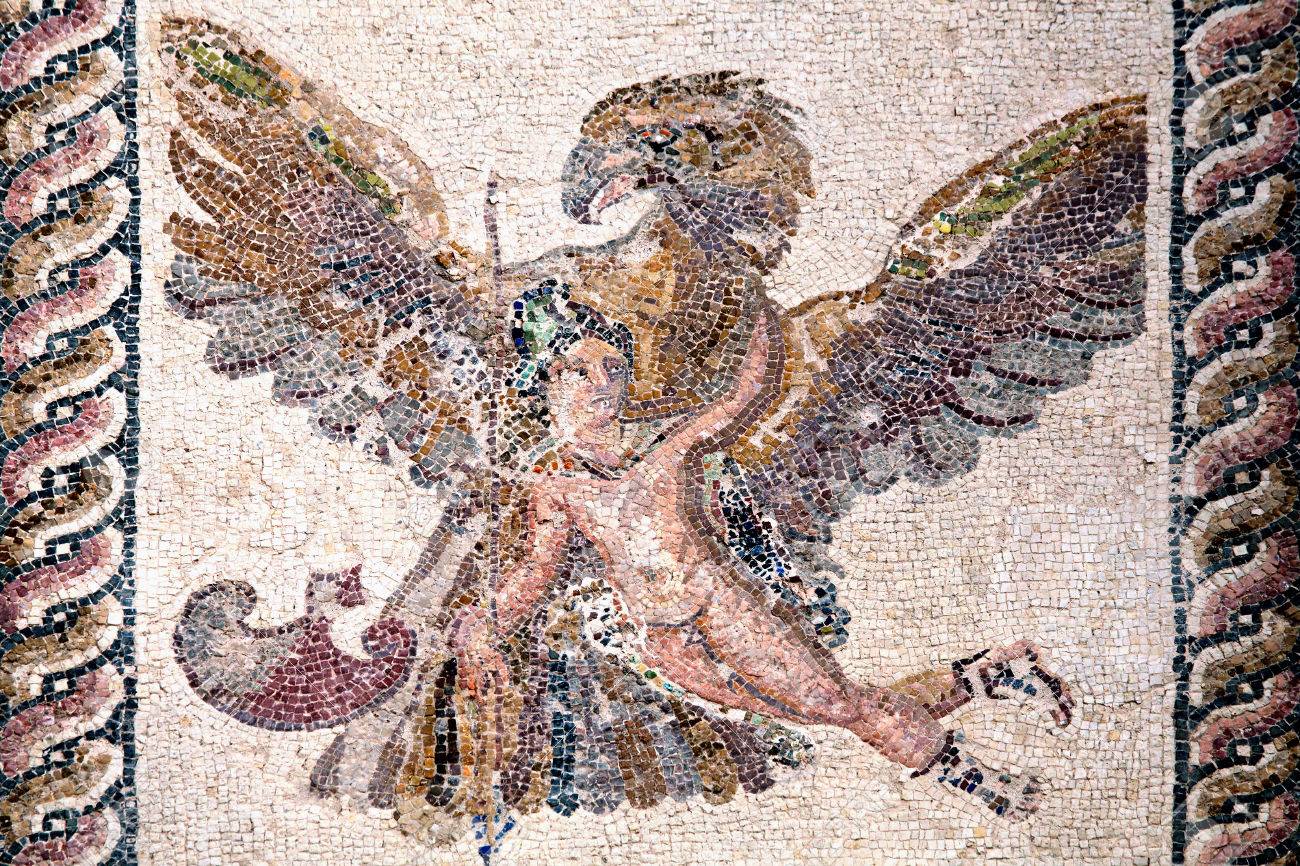
Ganymede & Eagle Mosaic (House of Dionysos, Cyprus, 2nd century CE)
Optional Response #2 draft due Wednesday, November 27 in D2L (11:59pm)
"Taking" stories in Alison: vulnerability of less powerful bodies (esp. in dangerous/violent landscapes); transformative & traumatic effects of abusive power/hierarchy
- Jupiter & Europa (Cadmus, Thebes): "Now, love does not go well with dignity" (2.846); theriomorphic Jupiter, lecherous shape-shifter – cf. "heavenly crimes" (6.131) on Arachne's tapestry; "he set down his sceptre, / put on a bull shape's, and mingled with the cattle . . . mooing . . . his long dewlap swings", abducts King Agenor's daughter (with Mercury's assistance in Sidon, Tyre: cf. Mercury in Aeneid)
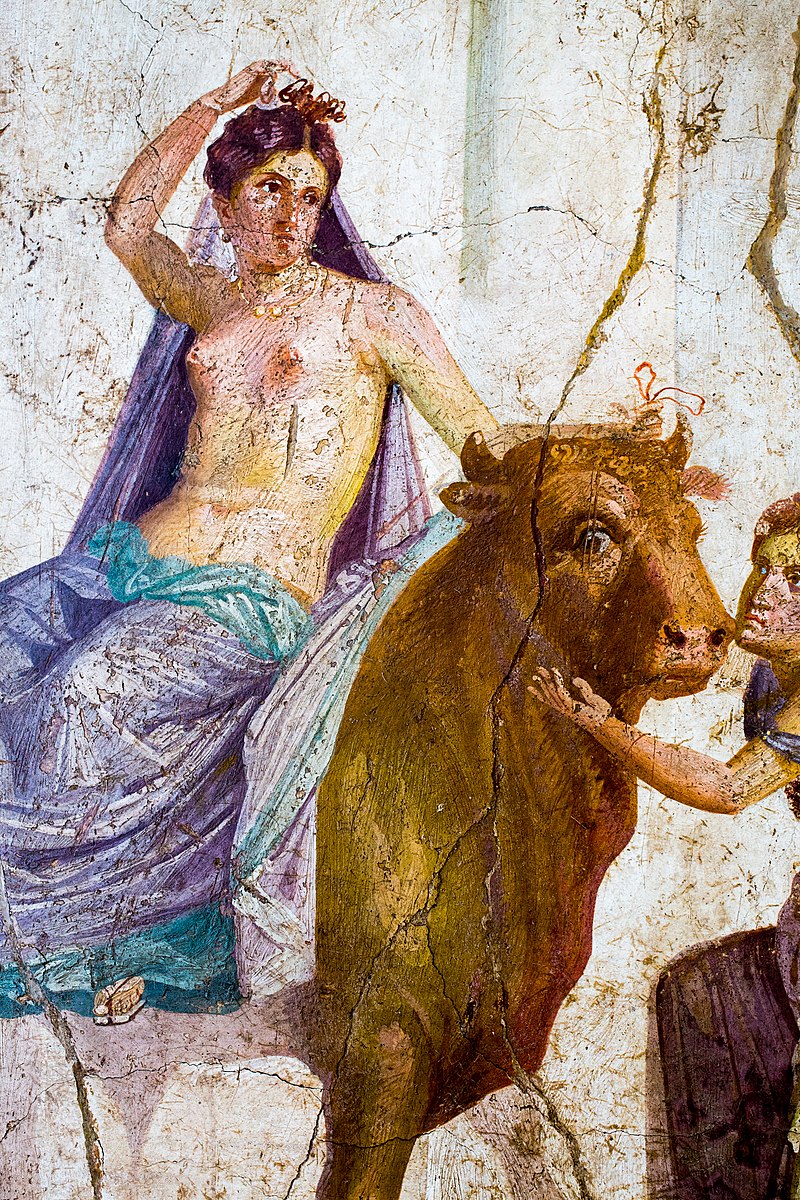
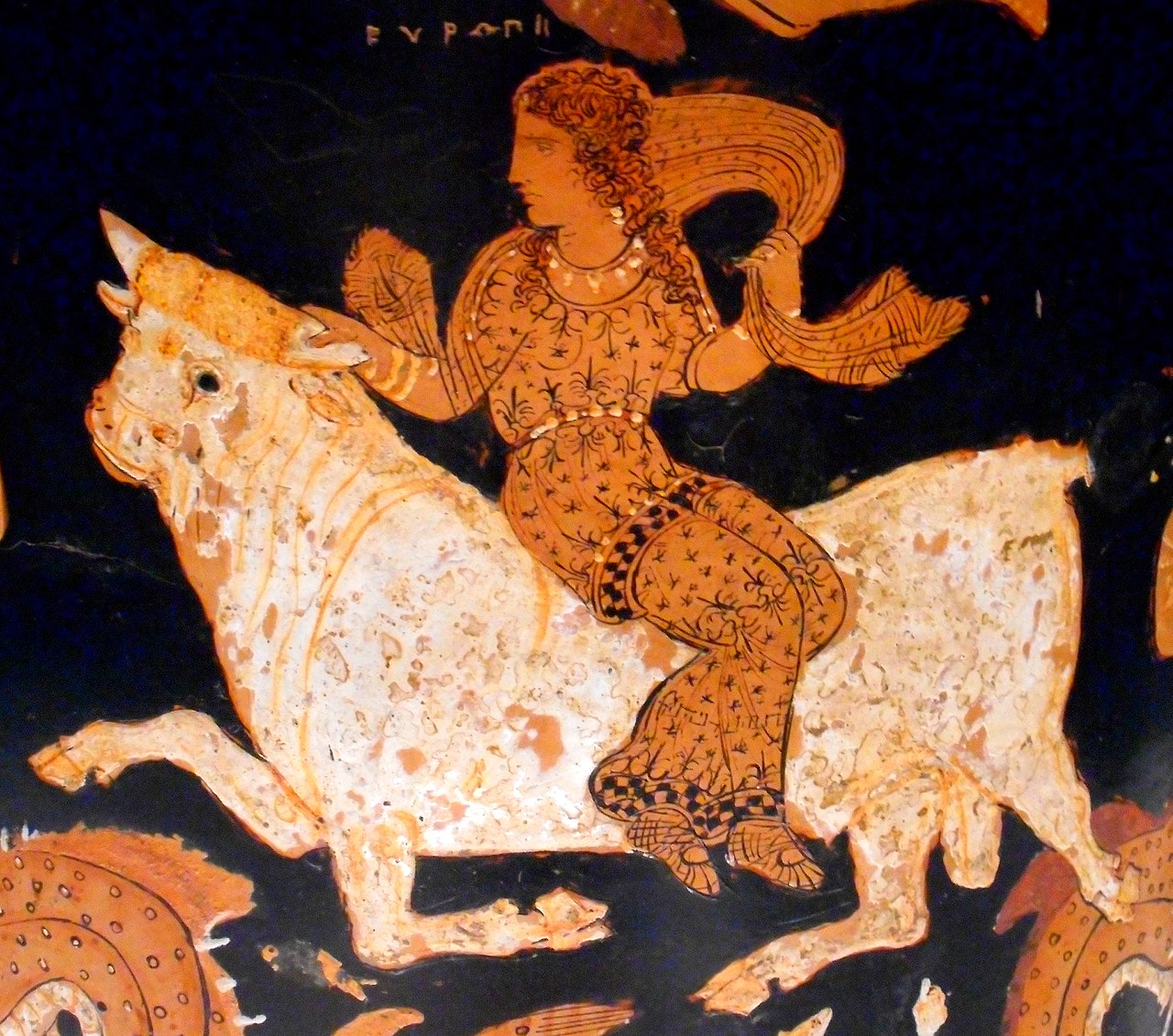
L: Assteas, Europa & Zeus (Paestum, ca. 360 BCE): R: Europa & bull (Pompeii, 1st century CE)
Metamorphoses 2.866-75 (Europa's innocence exploited)
Bit by bit, as her fear dissolves, he holds his breast
for girlish hands to pet, his horns wreathed
with fresh flowers. The princess even dares climb
the bull's back, no idea who she's really climbing.
And now the god edges from the beach's dry sand,
sinking false hoof prints below lapping waves.
Then deeper he goes, taking his prize to the wide
open sea.
She's frightened and stares at the shrinking
shore, clutches his horn with one hand and his back
with the other. Her shivering veil flits in the wind.
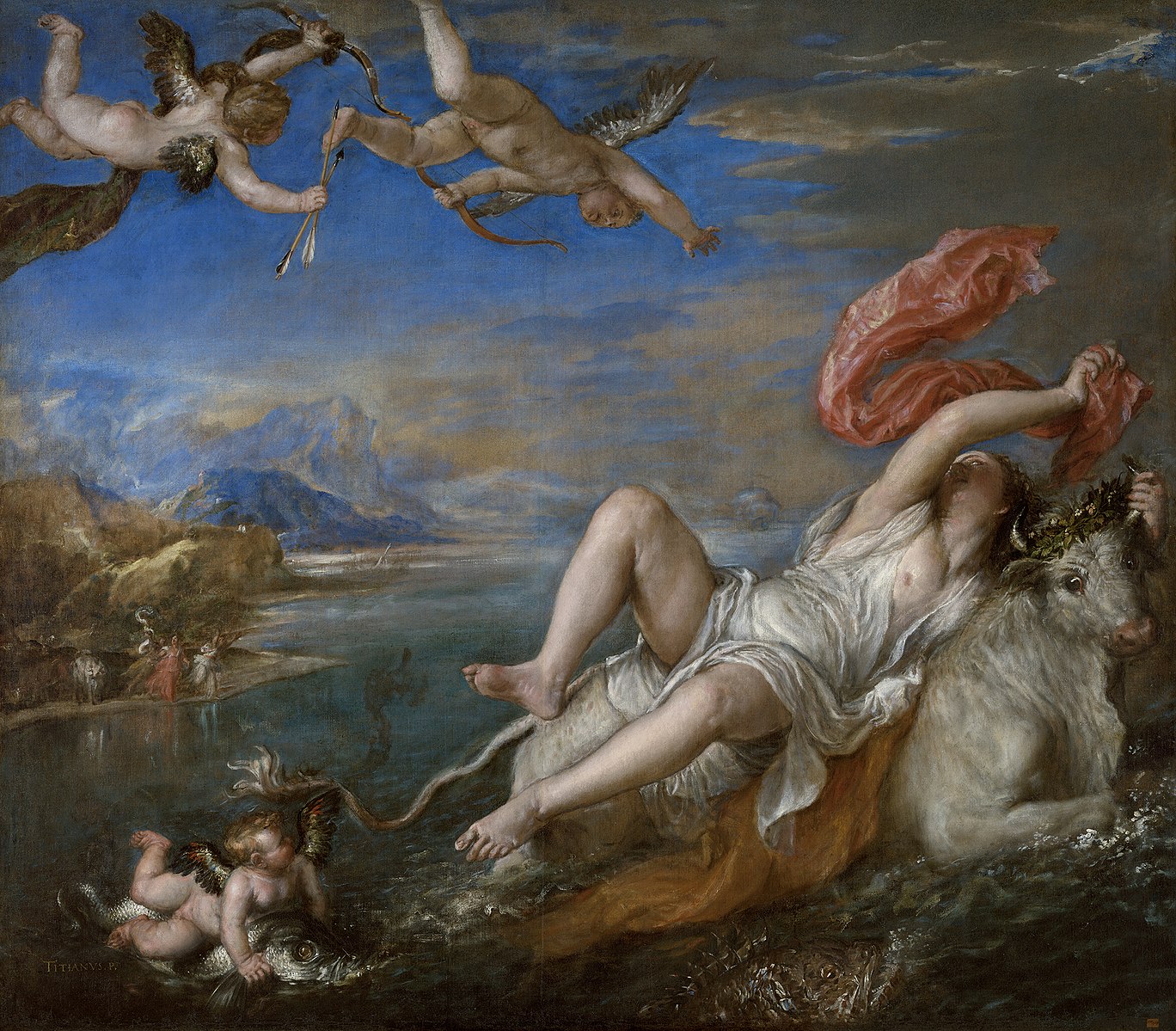
Titian, The Rape of Europa (1560)
- abrupt end (Metamorphoses 2 > Thebes): Europa not metamorphosized (Crete)
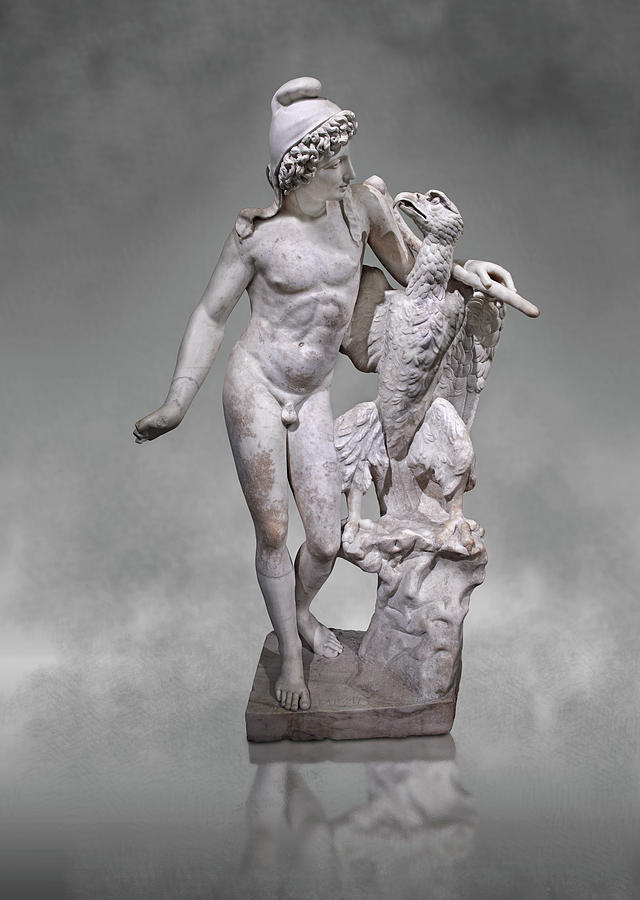
Ganymede & Eagle (2nd century CE Roman copy)
- Jupiter's metamorphosis into eagle & Ganymede: Orpheus (celebrates Jove's power) to sing of Jupiter’s love of boys (and girls in "illicit lust"); swift theft (enslavement), "Quick as light he whipped the air with counterfeit wings / and snatched away the Trojan boy, who now (though / Juno hates it) blends Jove’s drinks and pours his nectar", 10.159-61)
- Jupiter & Io: follows Daphne & Apollo in Metamorphoses 1 (Inachus, Io's father, misses river gods' meeting; Ovid's mirroring of reader reception, "Here the local rivers have gathered and wonder / if they should applaud or console Daphne's father", 1.572-3)
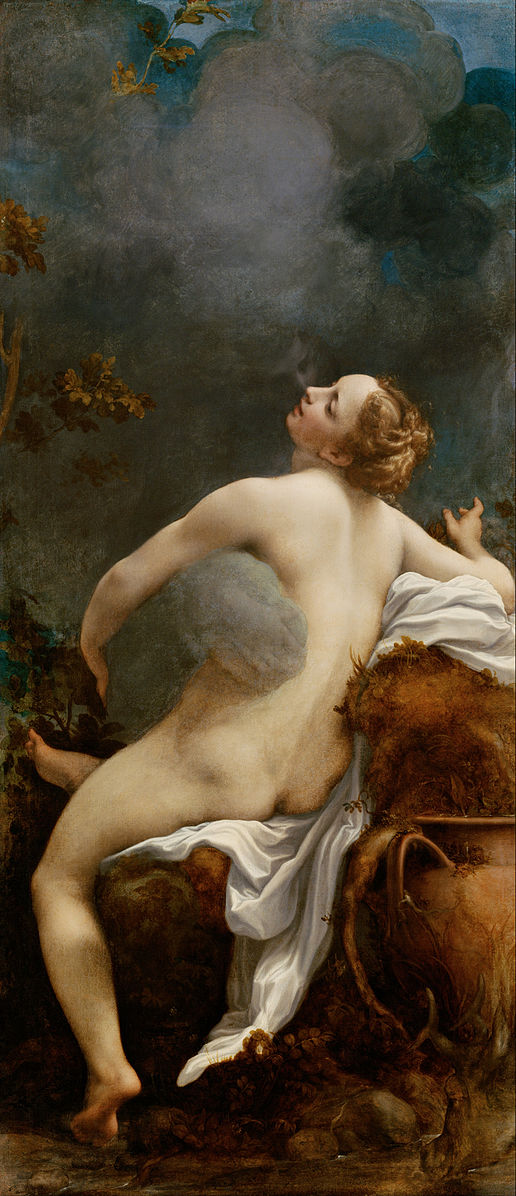
Correggio, Jupiter & Io (1520-1540); cf. "the god cloaked the broad fields in a thick / creeping cloud, caught the girl running, and raped her" (1.599-600)
- Juno's role after Io's rape (Argus)? Io's dysmorphia ("seeing her new horns / reflected she's shocked and shrinks back in fear", 1.640-1)
Metamorphoses 1.645-60 (Inachus realizes his daughter is transformed – tone?)
Old Inachus rips up some grass and holds it out;
she nuzzles her father’s hand, kisses his palms,
and can’t stop her tears—if words would just come,
she’d beg his help and tell her story and name.
No words—but letters her hoof draws in the sand
give the sorrowful sign of her transformation.
“Oh me!” cries Inachus, clutching the horns and
snowy neck of the heifer. She lows and he moans
“Oh Me!” again. “Is it really you, my girl I’ve looked
For all over? You were less painful unfound
than found so. You’re silent and utter no words
when I speak, but from deep in your heart you heave
such sighs and you do all you can—you moo.
I was stupidly ready for you to wed,
hoping for son-in-law, and grandbabies soon.
Now both your mate and young will come from a herd.
And I won’t even end these sorrows in death—
oh it hurts to be a god—the door to death
is shut to me and I will suffer on and on.”
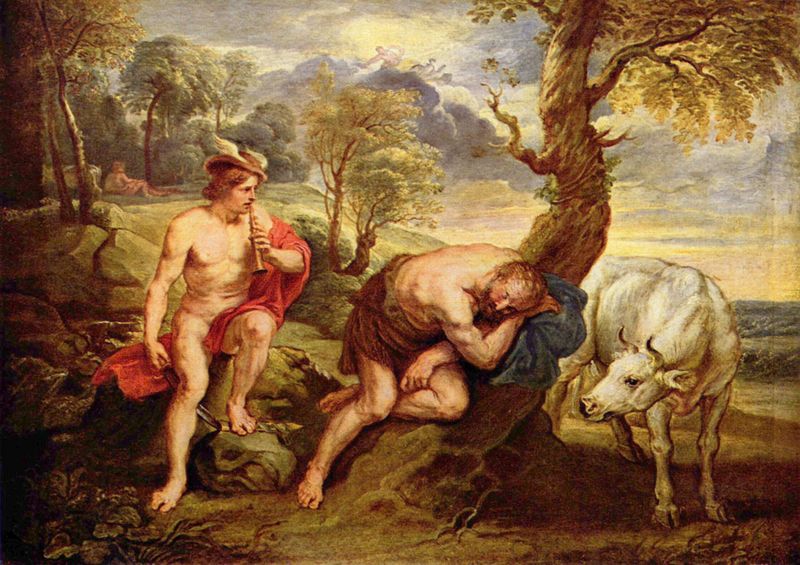
Rubens, Mercury & Argus (1635)
- pitying Jupiter sends Mercury to kill 100-eyed Argus: Mercury/shepherd's inset story (1.689-712) of lecherous Pan & virgin nymph Syrinx – aetiology of pan pipes/reed pipes, "change me" story left untold to Argus as narrator interrupts Mercury's story & summarizes (cf. Daphne & Apollo & Ovid’s readers) > Argus's metamorphosis)
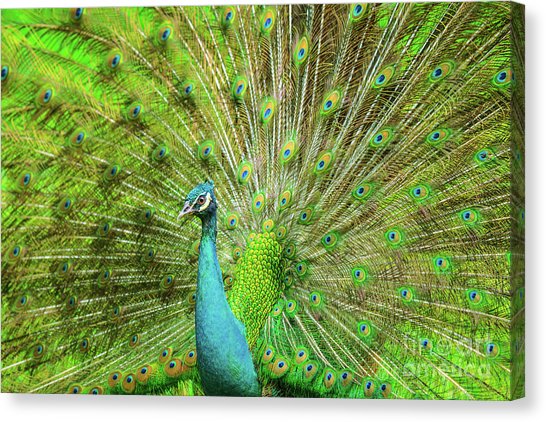
- Juno harasses Io across world (Egypt)
Metamorphoses 1.737-46 (Io's reverse metamorphosis)
Juno’s appeased: the girl resumes her former face
and becomes as she was. Hair falls from her skin,
horns wane away, the globes of eyes grow delicate,
the muzzle shrinks, her hands and arms resume their shape,
and each hoof divides into five slender fingers:
no aspect of the heifer remains but a sheen.
Happy now with just two feet, the nymph stands up
but is too scared to speak, afraid she’ll still
moo: nervously she utters a few broken words.
- compensation: Io > Isis ("Now worshipped is she as a most honored goddess by the linen-wearing throng", 1.747)
- Callisto (virgin huntress & Diana's favorite) & Jupiter: more deceptive shape-shifting/abuse, "showing himself and his crime" (2.433); Callisto's resistance/powerlessness, "She fights against him . . . / (you should have seen her, Juno: you'd be more fair) . . . but what man could a girl beat, / and who could beat Jove? (2.434ff.)
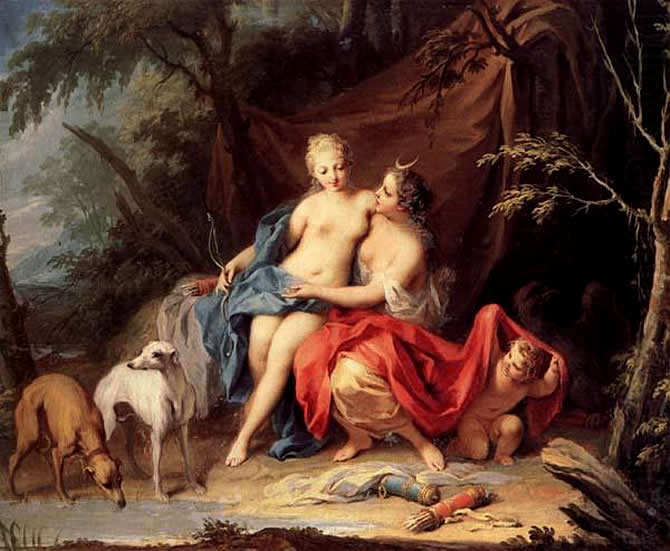
Jacopo Amigoni, Jupiter and Callisto (ca. 1740)
- Callisto's fear of Diana, trauma & shame ("she hardly lifts her gaze from the ground", 2.448); pregnancy discovered, Callisto exiled (double victimization)
- Juno's revenge
Metamorphoses 2.482-95 (Callisto's metamorphosis after Juno throws her to ground)
So no pleading or prayers could stir any feeling,
her power to speak is taken, too: a rough
growling noise rousing fear rumbles from her throat.
Yet the old thoughts remain inside the new bear,
and groaning on end she lifts hands (as they are)
to the sky and the stars to express her despair,
and knows Jove is ungrateful but can’t say the words.
So often now she won’t sleep alone in the woods
but wander fields and places that had been her home!
So often dogs hound over her rubbled ground
and the huntress scrambles off fearing the hunters!
Seeing a beast she hides. Forgetting she is one:
the girl-bear shudders to see male bears in the hills
and panics at wolves . . .
- matricide averted (Jupiter): Arcas, 15 years old hunter; transformation/compensation = Ursa Major, Ursa Minor
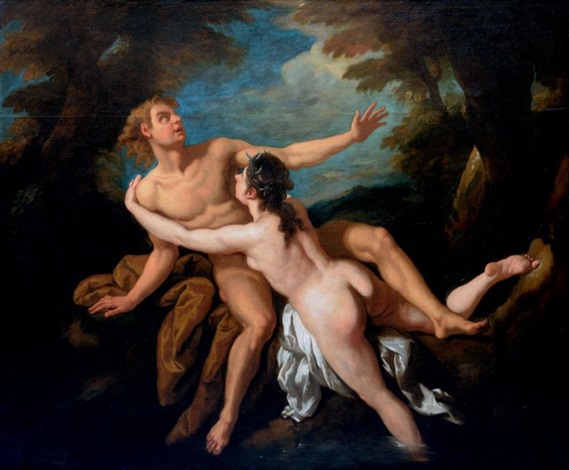
Jean Francois de Troy, Salmacis and Hermaphroditus (ca. 1740)
- Hermaphroditus & Salmacis: unusual aetiological tale of female desire ("taking"); assertive, hunt-shunning nymph of translucent pool Salmacis ("the only nymph quick Diana did not know" . . . "She just bathed her lovely self in her pond, / often she drew a boxwood comb through her hair, / or gazed in her glassy pool to see what looked best", 4.300ff.); "She was picking flowers / when she saw the boy and wanted what she saw" (4.315-16)
- virginal, 15 years old child of Mercury and Venus, "You could see both mother and father in his face, / and his name came from the two of them, too" (2.290-1); rejects Salmacis & swims in her pool ("I win him—he's mine!" cries the nymph as she flings / away all her clothes . . . she twines about him as he strains to slip / free, like a snake an eagle has snatched", 4.356ff.)
Metamorphoses 4.373-9 (Salmacis's prayer for fusion)
The gods
hear her wish: the two bodies fuse
together and join, one look smoothing over them
both. As when you graft a new sprig to a stem
and see the two join and grow together as one—
just like this, as their limbs entangle and meld,
they are no longer two but one doubled form,
not woman or boy: instead neither—or both.
- Hermaphroditus finally named at 4.382; final plea to mother and father?
.jpg)
Bernini, Rape of Proserpina (1621-1622)
- Ceres, Dis, Proserpina (daughter of Ceres & Jupiter): Muse telling complex narrative told by Muse (includes inset tale of Arethusa to Ceres, embedded metamorphoses): aetiological tale of marriage + cosmic myth of agriculture & seasons
- Venus resents Proserpina's remaining a virgin (as Minerva, Diana); Cupid > Ceres's uncle Dis investigating volcanic activity in Sicily (5.365ff.)
.jpg)
Persephone's abduction (Roman sarcophagus, 3rd century CE)
Metamorphoses 5.389-401 (innocent Proserpina seen at lake & taken by Dis)
Woods wreathe the lake all around, and leafy
boughs ward off the sun’s glancing rays like a shade.
Branches shed coolness; the moist earth, fresh buds;
Here it’s always springtime. As Proserpina plays
in this grove, plucking violets and luminous lilies,
tucking them in a basket or folds in her dress,
with girlish intent picking more than her friends—
in a stroke she’s seen and wanted and taken by Dis:
his desire is pure rush. The frightened young goddess
calls tearful cries to her friends and mother, mostly
her mother, and now she’s ripped the top of her dress,
the flowers she’s gathered fall loose from the folds.
And she’s still so young and still so simple
and losing her flowers makes her cry all the more.
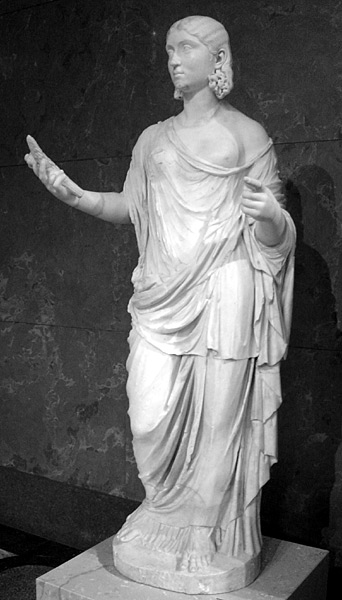
Woman as Ceres (3rd century CE)
- Ceres's reaction: famine, journey & complex narrative with sub-metamorphoses, i.e. dissolution of intervening Sicilian nymph Cyane, "The girl / must be asked, not taken", 5.415-16, Arethusa (personal story delayed, sighting of Proserpina in underworld), boy Ascalaphus & the pomegranate (screech-owl), Persephone's friends Sirens (birds)
- tensions of Roman marriage: Jupiter promotes Dis in final arrangement: "this act is no outrage / but true love. He'll be no shameful son-in-law . . ." (5.525-6)
Metamorphoses 5.564-71 (Jupiter arbitrates)
Now Jupiter, caught between brother and sister
in mourning, splits the revolving year in two.
The goddess’s spirit becomes amphibious:
she’ll spend six months with mother, six with her mate.
At once there’s a change in her thoughts and looks.
The face that had seemed so tragic to Dis
is suddenly glad—as when the sun, just covered
with storm clouds, burns a way through them and out.










.jpg)
.jpg)
